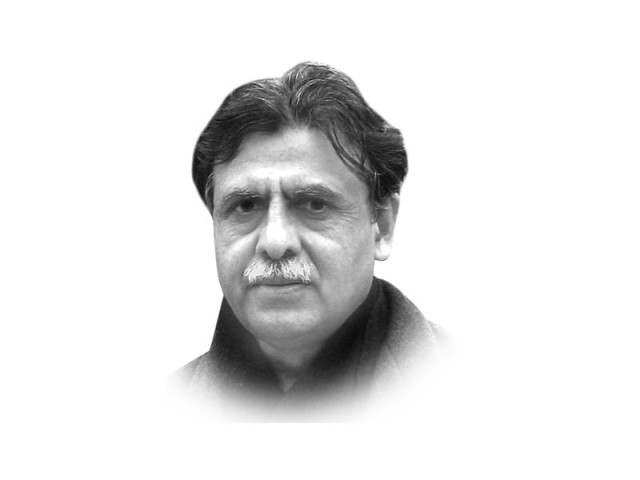Why India should show restraint
Forward thrust by India in heat of passion along LoC would have commensurate blowback in presence of hostile backyard.

The writer is a public policy analyst and former federal interior secretary
August 6 was the turning point, when two Indian soldiers were reportedly killed along the LoC in an ambush by terrorists. India was quick to lay the blame on Pakistan for the incident, with a dire warning to teach it a lesson. The Pakistani government outrightly denied the charge. Despite a long history of militancy in Indian-held Kashmir (IHK), the Indian authorities were not prepared to accept that the attack could have been from within as there had been a spate of ambushes in the Valley in the aftermath of Afzal Guru’s execution.
The recent happenings on the LoC and their aftermath have some lessons for us. First, the India-Pakistan relationship will not be the same in the foreseeable future. Secondly, the reckless act of a few has brought the two nuclear powers to the brink of a precipice. Thirdly, the incident has exposed the brittleness of the so-called peace process and along with that, what had gone into it over the years. It also underlined the tenuous nature of the foundation on which the normalisation process between the two countries was being built. Fourth, the two countries have been pushed to fall back on their maximalist positions, which they had stopped referring to. Pakistan hastened to talk about the UN resolutions to solve the long-festering Kashmir issue. India, on the other hand, lost no time in reviving its hackneyed claim on Azad Jammu and Kashmir and the Northern Areas.
As the crisis erupted, Pakistan’s civilian leadership was in the driving seat when it came to keeping tempers within limits and exhorting for restraint, while the Indian leadership called upon the Indian Army to give a befitting reply and teach Pakistan a lesson. What did these responses indicate? They spoke of the level of maturity of the two countries, while grappling with the vastly changing kaleidoscope of events, which is impinging on the lives of people living in this part of the world. Exchange of firepower continues, with guns booming on both sides and casualties taking place. Fun-seekers in Pakistan, ensconced in the posh cinema halls of Karachi and Lahore are busy watching Bollywood's ludicrous offering Chennai Express, while Indian youth went on the rampage, destroying the works of Pakistani artists, which was being exhibited in Ahmedabad.
In this war on terror, Pakistan has been badly mauled and bruised. Our armed forces and law enforcement agencies have taken the hydra-monster of terrorism by the horns. The Pakistan Army's doctrine of security has undergone a paradigmatic shift, with the issue of threat from within taking centre stage. As a corollary of this shift, there has been a severance of links between state institutions and non-state actors. On the domestic front, these non-state actors have been targeting state institutions on a regular basis, hitting at vital installations, targeting air bases and other important places, including the General Headquarters. India has not seen this kind of persistent violence, where ruthless elements have gone as far as slitting throats of their captives. India's allegation of Pakistan's complicity in the LoC killings is out of sync with the changing ground realities.
Bitterness over the Mumbai carnage has failed to efface from Indian minds. It evokes a deep sense of hurt that a regional power had to suffer. The attack also saw a complete breach of the country's maritime security cordon, while alarmingly signifying the outreach of terrorist outfits. India, henceforth, viewed every sporadic incident through the spectrum of the Mumbai assault. This approach instantly galvanises public opinion and provides a seamless bipartisan front against Pakistan. This perspective, however, fails to capture completely the autonomous character of militants as an independent driving force that permeates across political divides. It does not explain their ongoing onslaught against the security apparatus in Pakistan. Any hawkish stance by India against Pakistan implicitly benefits the militants, while it also tends to distract Pakistan from its ongoing internal war and overstretches its resources on the eastern front. Pakistan can ill-afford war-like conditions on two fronts.
Any forward thrust by India in the heat of passion along the LoC would have a commensurate blowback in the presence of a hostile backyard as militant forces in IHK might be down but they are certainly not out. It is, therefore, in India's interest to display restraint and help evolve a way to rule out the possibility of such incidents taking place in the future.
It cannot be denied that the footprints of the Mumbai attacks can be traced back to non-state actors in Pakistan. These elements were not only identified but were nabbed and sent for trial. Had justice been handed down on time in that case, it could have taken the sting out of the Indian propaganda machine. This laidback approach may not have been willful but it does speak for the kind of criminal justice system we have. One hopes that our proactive judiciary takes notice of such cases, which have held the country's reputation hostage.
Published in The Express Tribune, August 27th, 2013.
Like Opinion & Editorial on Facebook, follow @ETOpEd on Twitter to receive all updates on all our daily pieces.















COMMENTS
Comments are moderated and generally will be posted if they are on-topic and not abusive.
For more information, please see our Comments FAQ